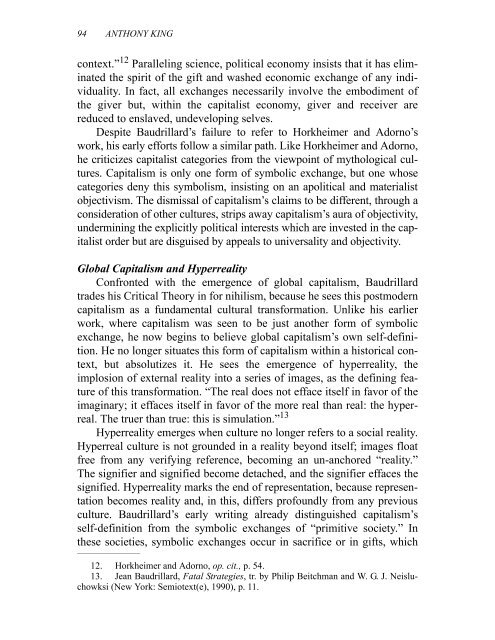King Baudrillard Telos.pdf - Exeter Research and Institutional ...
King Baudrillard Telos.pdf - Exeter Research and Institutional ...
King Baudrillard Telos.pdf - Exeter Research and Institutional ...
Create successful ePaper yourself
Turn your PDF publications into a flip-book with our unique Google optimized e-Paper software.
94 ANTHONY KING<br />
context.” 12 Paralleling science, political economy insists that it has eliminated<br />
the spirit of the gift <strong>and</strong> washed economic exchange of any individuality.<br />
In fact, all exchanges necessarily involve the embodiment of<br />
the giver but, within the capitalist economy, giver <strong>and</strong> receiver are<br />
reduced to enslaved, undeveloping selves.<br />
Despite <strong>Baudrillard</strong>’s failure to refer to Horkheimer <strong>and</strong> Adorno’s<br />
work, his early efforts follow a similar path. Like Horkheimer <strong>and</strong> Adorno,<br />
he criticizes capitalist categories from the viewpoint of mythological cultures.<br />
Capitalism is only one form of symbolic exchange, but one whose<br />
categories deny this symbolism, insisting on an apolitical <strong>and</strong> materialist<br />
objectivism. The dismissal of capitalism’s claims to be different, through a<br />
consideration of other cultures, strips away capitalism’s aura of objectivity,<br />
undermining the explicitly political interests which are invested in the capitalist<br />
order but are disguised by appeals to universality <strong>and</strong> objectivity.<br />
Global Capitalism <strong>and</strong> Hyperreality<br />
Confronted with the emergence of global capitalism, <strong>Baudrillard</strong><br />
trades his Critical Theory in for nihilism, because he sees this postmodern<br />
capitalism as a fundamental cultural transformation. Unlike his earlier<br />
work, where capitalism was seen to be just another form of symbolic<br />
exchange, he now begins to believe global capitalism’s own self-definition.<br />
He no longer situates this form of capitalism within a historical context,<br />
but absolutizes it. He sees the emergence of hyperreality, the<br />
implosion of external reality into a series of images, as the defining feature<br />
of this transformation. “The real does not efface itself in favor of the<br />
imaginary; it effaces itself in favor of the more real than real: the hyperreal.<br />
The truer than true: this is simulation.” 13<br />
Hyperreality emerges when culture no longer refers to a social reality.<br />
Hyperreal culture is not grounded in a reality beyond itself; images float<br />
free from any verifying reference, becoming an un-anchored “reality.”<br />
The signifier <strong>and</strong> signified become detached, <strong>and</strong> the signifier effaces the<br />
signified. Hyperreality marks the end of representation, because representation<br />
becomes reality <strong>and</strong>, in this, differs profoundly from any previous<br />
culture. <strong>Baudrillard</strong>’s early writing already distinguished capitalism’s<br />
self-definition from the symbolic exchanges of “primitive society.” In<br />
these societies, symbolic exchanges occur in sacrifice or in gifts, which<br />
12. Horkheimer <strong>and</strong> Adorno, op. cit., p. 54.<br />
13. Jean <strong>Baudrillard</strong>, Fatal Strategies, tr. by Philip Beitchman <strong>and</strong> W. G. J. Neisluchowksi<br />
(New York: Semiotext(e), 1990), p. 11.
















